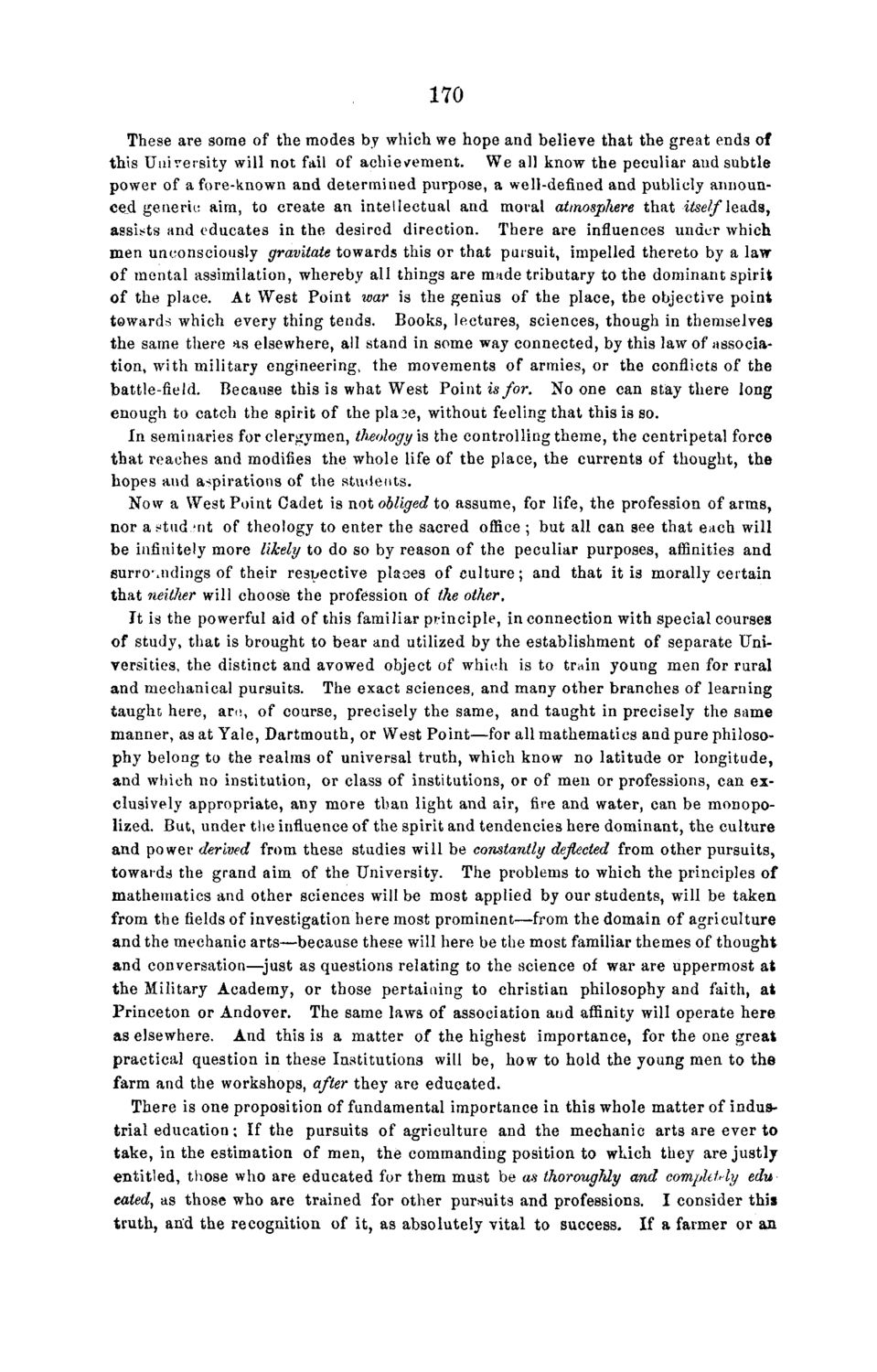| |
| |
Caption: Board of Trustees Minutes - 1868
This is a reduced-resolution page image for fast online browsing.

EXTRACTED TEXT FROM PAGE:
170 These are some of the modes by which we hope and believe that the great ends of this University will not fail of achievement. We all know the peculiar and subtle power of afore-known and determined purpose, a well-defined and publicly announced generic aim, to create an intellectual and moral atmosphere that itself leads, assists and educates in the desired direction. There are influences under which men unconsciously gravitate towards this or that pursuit, impelled thereto by a law of mental assimilation, whereby all things are made tributary to the dominant spirit of the place. At West Point war is the genius of the place, the objective point towards which every thing tends. Books, lectures, sciences, though in themselves the same there as elsewhere, all stand in some way connected, by this law of association, with military engineering, the movements of armies, or the conflicts of the battle-field. Because this is what West Point is for. No one can stay there long enough to catch the spirit of the pla^e, without feeling that this is so. In seminaries for clergymen, theology is the controlling theme, the centripetal force that reaches and modifies the whole life of the place, the currents of thought, the hopes and aspirations of the students. Now a West Point Cadet is not obliged to assume, for life, the profession of arms, nor a student of theology to enter the sacred office ; but all can see that each will be infinitely more likely to do so by reason of the peculiar purposes, affinities and surro-aidings of their respective plaoes of culture; and that it is morally certain that neither will choose the profession of the other. It is the powerful aid of this familiar principle, in connection with special courses of study, that is brought to bear and utilized by the establishment of separate Universities, the distinct and avowed object of which is to train young men for rural and mechanical pursuits. The exact sciences, and many other branches of learning taught here, an;, of course, precisely the same, and taught in precisely the same manner, as at Yale, Dartmouth, or West Point—for all mathematics and pure philosophy belong to the realms of universal truth, which know no latitude or longitude, and which no institution, or class of institutions, or of men or professions, can exclusively appropriate, any more than light and air, fire and water, can be monopolized. But, under the influence of the spirit and tendencies here dominant, the culture and power derived from these studies will be constantly deflected from other pursuits, towards the grand aim of the University. The problems to which the principles of mathematics and other sciences will be most applied by our students, will be taken from the fields of investigation here most prominent—from the domain of agriculture and the mechanic arts—because these will here be the most familiar themes of thought and conversation—just as questions relating to the science of war are uppermost at the Military Academy, or those pertaining to christian philosophy and faith, at Princeton or Andover. The same laws of association and affinity will operate here as elsewhere. And this is a matter of the highest importance, for the one great practical question in these Institutions will be, how to hold the young men to the farm and the workshops, after they are educated. There is one proposition of fundamental importance in this whole matter of industrial education; If the pursuits of agriculture and the mechanic arts are ever to take, in the estimation of men, the commanding position to wLich they are justly entitled, those who are educated for them must be as thoroughly and completely edu cated, as those who are trained for other pursuits and professions. I consider this truth, and the recognition of it, as absolutely vital to success. If a farmer or an
| |